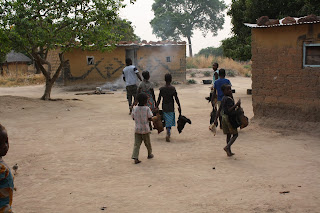 |
| The vaccine was mixed with water, put into syringes, and then placed in the chicken's mouth. |
Due to this, I ran an idea by the women for a way that they could raise money to buy these fingerlings. We would do this by buying a chicken vaccine, then selling doses of it to locals that were interested in vaccinating their chickens.
 |
| The vaccine was enough to treat 1,000 chickens. Although only about 150 chickens were treated. This was because not as many people were interested in vaccinating their chickens as we had hoped. |
The vaccination cost about $4 to buy, with each of the women contributing just 30 cents apiece to buy the vaccination. The women would then vaccinate chickens for the small price of five chickens for 20 cents. It was incredibly cheap, which made it doable in a village setting. Their vaccination was good for 1,000 chickens - which, if sold completely, would raise about $40.
Unfortunately, the women's club didn't vaccinate 1,000 chickens, instead about 150 chickens. But, they did raise enough money to earn their investment back, and then some. So for a very small investment the women now have raised enough money for 60 fish to put into their pond.
 |
| Here, Enedy is holding the chicken's mouth open, while Beauty is administering the vaccination. The woman in the back is named Vivian. All are members of the Tukwatankane Women's Club. |
Those fish will be delivered by the Department of Fisheries on Friday, November 15th. The delivery of these fish mark the end of a long journey to this point. But the women will have a fully functioning fish farm and after 6 months they'll be able to harvest, then eat and sell their fish.
 |
| After the vaccination the chickens were carried off and returned to their villages. |

No comments:
Post a Comment